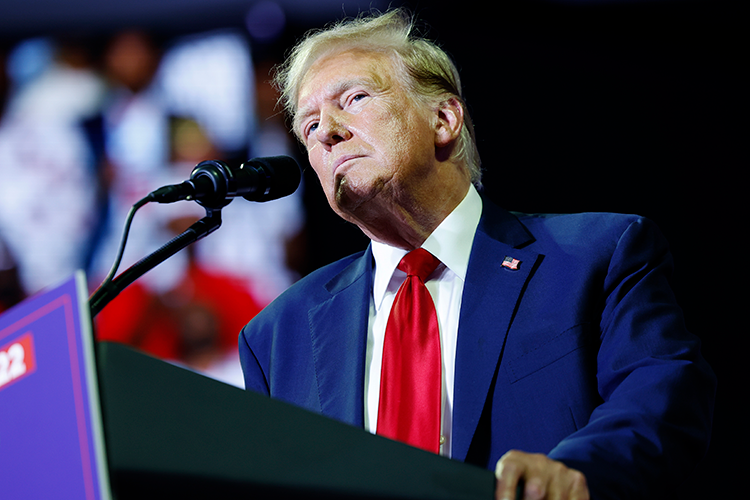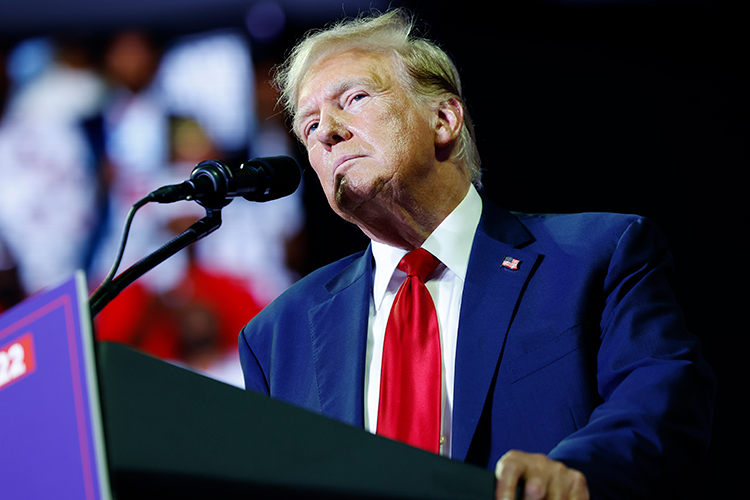Law Firms
BigLaw firms defend pro bono deals with Trump as they handle influx of requests for legal help

Nine BigLaw firms defended their multimillion-dollar pro bono deals with President Donald Trump as legal and ethical in letters to lawmakers obtained by Law360 and Law.com. (Photo by Anna Moneymaker/Getty Images)
Nine BigLaw firms defended their multimillion-dollar pro bono deals with President Donald Trump as legal and ethical in letters to lawmakers obtained by Law360 and Law.com.
The law firms said the deals don’t fundamentally change their core values or preexisting policies, according to Law360. They responded to requests for information by 16 Democrats, including U.S. Rep. Dave Min of California and U.S. Rep. April McClain Delaney of Maryland, who are lawyers.
In the agreements, the firms pledged to provide pro bono hours to causes supported by the firms and Trump. They told lawmakers that the deals allowed them to avoid investigations by the Equal Employment Opportunity Commission or punitive executive actions that suspend lawyers’ security clearances and put their clients’ government contracts at risk.
One of the firms—Skadden, Arps, Slate, Meagher & Flom—said it had changed its pro bono policy so that representation is in the name of the firm, rather than individual lawyers, according to Law.com. The new policy ensures “that pro bono activities represent a broad spectrum of worthwhile causes,” its letter said.
The firms responded as they are receiving requests for free legal help, many of them from veterans, as well as groups and people aligned with Trump, the New York Times reports.
“Just two months after striking the deals with Mr. Trump,” the New York Times reports, “law firms are in uncharted territory. They are trying to make good on their pro bono commitments to Mr. Trump while not giving up their autonomy to choose cases or alienating their staff, who want to work on legal issues that broadly serve the public’s interest.”
One of the help requests came from conservative media personality and lawyer Greta Van Susteren, who asked Skadden to help a veteran sue a Michigan judge for allegedly violating his civil rights by issuing an unfair protective order in his divorce.
Skadden said it would not represent the veteran, but it might be able to play some kind of support role in the case, according to an email obtained by the New York Times.
A group created by the Heritage Foundation, a conservative think tank, called the Oversight Project has also asked dozens of firms to provide up to $10 million in free legal help to conservative groups, the New York Times says.
The White House has not made direct requests to firms to provide pro bono help to a specific person or a group, according to an administration official who spoke with the New York Times.
Besides Skadden, the firms that made the deals are Paul, Weiss, Rifkind, Wharton & Garrison; Milbank; Willkie Farr & Gallagher; Kirkland & Ellis; A&O Shearman; Simpson Thacher & Bartlett; Latham & Watkins; and Cadwalader, Wickersham & Taft.
The lawmakers had asked whether the deals violated federal bribery and anti-fraud laws and whether they created potential ethics violations with respect to conflicts of interest and limits on future law practice.
“We would never do anything to compromise our ability to advocate zealously on behalf of our clients, and we certainly reject any suggestion that any element of the agreement is contrary to law,” said Brad Karp, the chairman at Paul Weiss, in a reply to lawmakers.
Min was not satisfied with the responses.
“As a former SEC enforcement attorney and law professor, I believe in the importance of integrity and the rule of law. None of these nine law firms provided any facts or real assurances to suggest that their agreements are not violating the rule of law,” he told Law360 in a statement.
Write a letter to the editor, share a story tip or update, or report an error.

